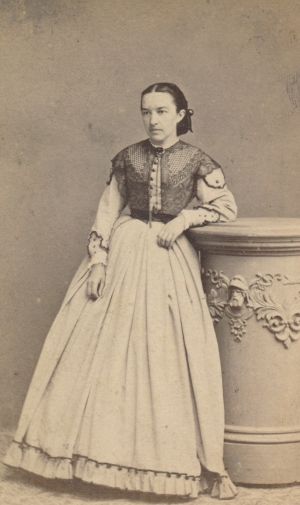Henriette Eckart (Da VII 1)
Henriette Christine Johanna Caroline Kunigunda Barbara Eckart, (Da VII 1), (*April 27, 1826, in Emskirchen, Germany, †January 15, 1902, in Munich, Germany).
Source text concerning Henriette Eckart
Short biography about Henriette, written down by her niece Hedwig Helms, from the Chronicle of the Eckart Family (FA-S346); compiled by Otto Eckart in 1927, part handwritten and part typed.
From her earliest youth, "Aunt Jette" dedicated her life to caring for others. In the same way that she, the eldest child, lovingly cared for her eleven younger siblings and selflessly helped her beloved mother until her death, her later life was also entirely devoted to the loving care of her extended family. Wherever a reliable person was needed in the family, "Aunt Jette" was called. Nobody was so selfless, kind-hearted and self-sacrificing when it came to caring for the sick, the children and the women in childbed.
Following the death of her mother, she came to Uncle Philipp Wich, her mother’s brother who lived in Nieder-Altenburg, as the family’s help, support and kind companion and confidante. Her absolute reliability and selfless devotion to whatever was entrusted to her led my father, for several years during the berry season, to send her to densely wooded regions to buy berries. Most of the time, several children were sent along with her, and these summer holidays in Wanstein, Zwiesel, Holzkirchen are among our most beautiful childhood memories. While she herself was a paradigm of touching unpretentiousness and modesty combined with an exemplary sense of duty, she also knew how to keep a tight rein on us children and teach us to be modest. Her spreading butter on bread became legendary in the family. She, whose hands were never idle, who – despite her always strenuous activities – gave the most beautiful handiworks, especially elaborate embroideries, to all her loved ones, also ensured that the children placed in her care kept their hands busy. She demonstrated benevolent patience when teaching numerous nieces how to knit, sew and embroider. All the while, she was good at telling stories, fairytales as well as stories from her childhood. It was always a great pleasure for us when Aunt Jette came from Altenburg to visit, with her resilient self-made travel bag, bearing the inscription "Bon voyage" stitched in beads and which we children nearly snatched out of her hand, because we knew that it contained something for every one of us. It was the greatest pleasure for the good aunt, who was so infinitely unassuming when it came to herself, to give presents to other people as far as her modest means allowed. Nobody was forgotten, even if it was only a fried dough pastry typical for Kirchweih celebrations or a small purse knitted from wool.
References
The death of her beloved brother, my father, deeply unsettled her. I can still see how she sat at his bed in his hour of death, unable to shed a single tear, how she took his hands time and again, that had gone cold, and how she then talked about him in the gray hour of the dawning November morning, told stories from his earliest childhood that we did not know yet and that probably only crossed her mind again after many years in the face of his death. Beside him, she had to bemoan the death of two beloved sisters, Aunt Jakobine Schneider, who died on January 11, 1900, and Aunt Henriette Blaufuss, who died on January 25, 1901. Her faith in God, without any trace of bigotry, and her submissiveness to God’s will made her strong enough to bear these losses, before she herself closed her faithful eyes forever on January 15, 1902, deeply mourned by all who were close to her.
She was a strong personality, and, at the same time, a model of self-sacrificing devotion whenever demanded by the interests of her family, that she loved more than anything. When I released her dead hands from mine, I had to think of the line that she wrote in my friendship book and that proved true when it came to her:
Once, when you were born out of love, You cried, while your loved ones were glad. Live in a way that, when your time comes, You are glad, while your loved ones weep.
Written in memory of Aunt Jette by Hedwig Helms, née Eckart
She is buried in the grave of her brother Friedrich Eckart in the Alter Südfriedhof (Old South Cemetery) in Munich.[1]
References
- ↑ Eckart Family Archive, FA-S346 Chronicle of the Eckart Family, compiled by Otto Eckart, transcript.
